 We’ve seen it coming for months. Zika has been moving with hurricane intensity throughout South America and the Caribbean, appearing for the first time in 42 countries in the Western Hemisphere in less than two years. Originally thought a mild infection, Zika’s unanticipated ability to cause serious fetal abnormalities startled scientists and health officials into taking the virus much more seriously.
We’ve seen it coming for months. Zika has been moving with hurricane intensity throughout South America and the Caribbean, appearing for the first time in 42 countries in the Western Hemisphere in less than two years. Originally thought a mild infection, Zika’s unanticipated ability to cause serious fetal abnormalities startled scientists and health officials into taking the virus much more seriously.
Experts have been warning for months that the U.S. mainland was vulnerable, too, especially southern states that still harbor Aedes aegypti, the principal mosquito species involved in Zika transmission. So it should come as no surprise that last Friday, the Centers for Disease Control and the Florida Department of Health confirmed what we’ve all been expecting: four locally transmitted cases of Zika in Miami-Dade and neighboring Broward counties, all apparently acquired in the same part of Miami. Ten more cases were confirmed on Monday, and it is very likely more will come to light over the coming weeks.
Staff Physician Consultant, Dr. Evan Malone, explains “Due to the documentation of domestic infection (South Florida), prevention strategies AT HOME should be at the top of the personal protection list, including transmission via sexual intercourse (i.e. infected individual (from mosquito) transmits the virus to non-infected individual).”
The Aedes aegypti mosquito is notorious for efficiently transmitting deadly yellow fever and dengue, a ubiquitous tropical disease, as well as Zika. A number of U.S. states, especially in the Gulf, have their own sizable populations of Aedes aegypti. Once the local mosquitoes pick up one of these viruses by biting an infected person, they can transmit them as efficiently as their tropical cousins. We know this historically from the rough parallel of dengue, carried by the same mosquito species, which has caused outbreaks in Puerto Rico (now also suffering from Zika since December 2015), Florida, Texas and Arizona.
 Taking this information into consideration be safe and enjoy the season. If you have more specific questions in regard to Zika please consult your community and governmental resources – local health department, CDC, and your medical provider.
Taking this information into consideration be safe and enjoy the season. If you have more specific questions in regard to Zika please consult your community and governmental resources – local health department, CDC, and your medical provider.
Dr. Malone also states. “Testing is available (blood, urine samples) and is directed by your healthcare provider or local health department, however, testing for the virus will not change the outcome so long as the supportive treatment strategy is the same. Those with concurrent medical illness (renal disease, liver disease, immunocompromised state) should not hesitate to report possible exposure or suspected symptoms.”
If you would like to know more, Dr. Malone suggests following the guidelines as set forth by the Centers for Disease Control and Prevention: http://www.cdc.gov/zika/